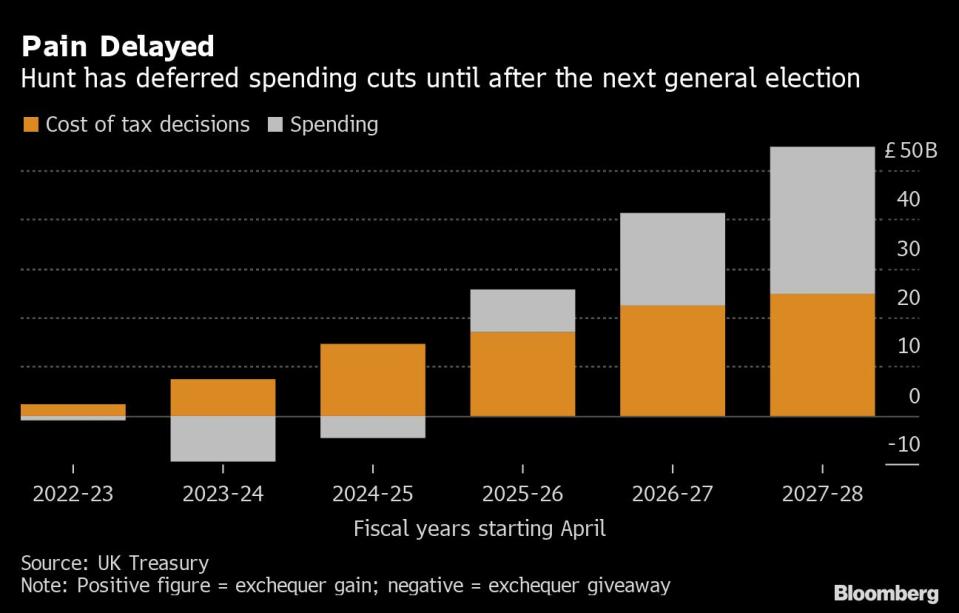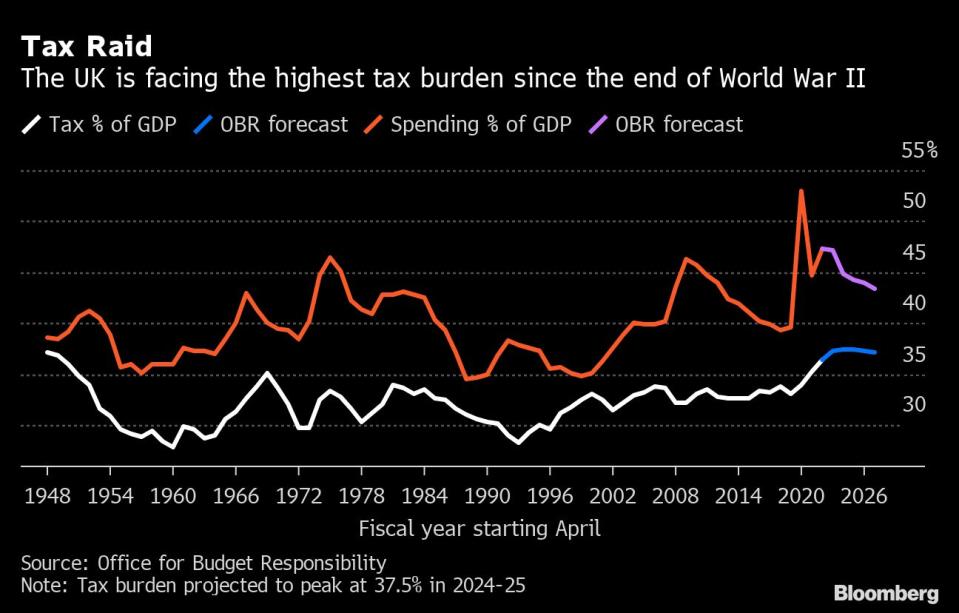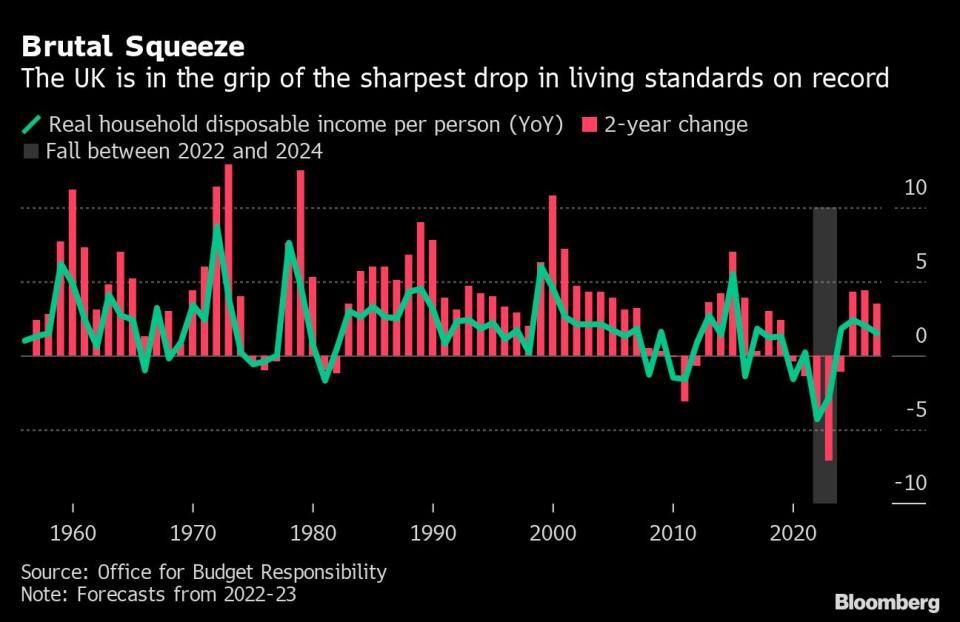Tories Ask UK’s Sunak and Hunt: Is There Any Way Back From Here?
(Bloomberg) -- Jeremy Hunt’s massive package of tax rises on Thursday is a death knell for the UK’s ruling Conservatives, members of his own party fear.
Most Read from Bloomberg
Malaysia Latest: Tight Election Race Points to Hung Parliament
Musk Says Trump Will Be Reinstated on Twitter After Poll Win
COP27 Poised for Deal After Breakthrough on Climate Payments
Musk’s Twitter Fix-It Team Fades Out as Billionaire Says Transition Is Almost Done
The Chancellor of the Exchequer raised Britain’s tax burden by £25 billion ($30 billion) as part of efforts to plug a gaping hole in the budget and stabilize the economy. But for many Conservative Members of Parliament, it represents an assault on middle class households that leaves tens of millions of Britons worse off.
More than a dozen Tory MPs and staffers describe a party at rock bottom following a year of mayhem that saw Boris Johnson’s government fall in scandal and then its experiment with free-market “Trussonomics” under Liz Truss implode in just seven weeks. They spoke with Bloomberg after Hunt’s statement on condition of anonymity in order to discuss their concerns freely.
With the Tories trailing the opposition Labour Party by more than 20 points in recent polls, the question that will define Rishi Sunak’s premiership is whether there is any way back.
Their prospects are bleak. With at most 26 months before an election, they’re presiding over the sharpest squeeze in living standards since records began, inflation at a 41-year high, and a recession predicted to last through 2023.
There were few positives for the party in Thursday’s shock dose of tax rises and deferred austerity. Moreover, Hunt’s £55 billion of tax rises and spending cuts follows September’s £45 billion of fiscal loosening by his predecessor, Kwasi Kwarteng: a £100 billion swing in policy settings in less than two months. That flip-flopping does little to present a narrative of a party in control.
Tory MPs worry the public will view the five administrations since 2010 as a collective failure defined by economic malaise and political chaos, and put them out of power for a generation.
Party chiefs publicly blame global forces such as the Covid-19 pandemic and Russia’s war in Ukraine. While they are factors, it’s won little sympathy. Some MPs predict the polling gap to Labour will widen further. One said there is an end-of-days feel.
One thing that could help the Tories is Hunt’s decision to defer inflicting spending cuts on an austerity-weary electorate until after an election. A government official said the cuts would devastate already-crumbling public services. The hope is the economic climate improves and the cuts aren’t needed. And if the outlook doesn’t pick up, the Tories will almost certainly lose the election, leaving Labour hamstrung by enforced higher taxes and spending cuts, they said.
Nevertheless, one MP said there’s so much to dislike in Hunt’s package that there’s no point in rebelling on individual measures. Many lawmakers are resigned to their fate and already planning their next careers, they said.
The gravest worry among Tory strategists is that while Hunt had framed his plans as targeting the wealthy, the narrative has quickly shifted to the impact on the middle classes. The Treasury’s own analysis shows 55 percent of households will lose out as a result of Thursday’s statement.
Downing Street aides expected Friday’s newspaper front pages to be tough, but were shocked at how badly their plans landed after weeks of careful expectations management from spin doctors.
The Telegraph compared Hunt and Sunak to former Labour Prime Minister Gordon Brown -- a serious charge in Tory circles. For the Daily Mail to tell its readers that the Tories were no longer on the side of “strivers” is an electoral nightmare, one strategist said. An MP said that under the Tories the so-called “squeezed middle” had become the smashed middle.
Lawmakers across the party disagreed on what they hated most. Some criticized the decision to make 130,000 more people pay the top income tax rate. Others complained about rises in council tax.
One Tory warned of the damage to thousands of higher-earning voters with mortgages who don’t consider themselves rich but will be hit hard by higher taxes and interest rates. Their votes are crucial to Tories in marginal seats.
Business-minded Tories are flummoxed by the decision to raise employers’ National Insurance contributions, something the party has previously condemned as a jobs tax.
“What is the Conservative Party?” Tina McKenzie, policy chair at the Federation of Small Businesses, told Bloomberg Radio. “Is it a party of business? I don’t know.”
A younger MP said the government was cowardly in protecting pension rises, arguing Hunt should have asked wealthier pensioners to contribute more, rather than saddle the burden on younger generations. They said people under 50 had no reason to vote Conservative.
Another senior Tory argued a third way was needed between Truss’s unfunded tax cuts and Thursday’s fiscal retrenchment: something to calm markets without destroying Conservative electoral prospects. But a government official insisted there was no plausible alternative.
The sheer scale of the Tory displeasure illustrates how factional the party is after 12 years in power under five premiers.
The elephant in the room is Brexit, which is central to the Tory catastrophe, one MP said. Austerity and Treasury orthodoxy under David Cameron and his chancellor, George Osborne, contributed to the decision to leave the European Union that ended their political careers. Theresa May’s “Red Toryism” was detonated by her doomed softer Brexit deal, while Johnson’s harder Brexit and leveling up agenda ended in unprecedented infighting and ultimately, failure. Truss’s efforts to implement the right-wing libertarian Brexiteer dream were calamitous, leaving Sunak and Hunt to pick up the pieces.
Six years on from the referendum, the chancellor on Friday conceded in a BBC interview that joining the EU’s single market would boost growth, while a YouGov poll found just 32% still think Brexit was the right decision.
The public has lost patience with the gyrations of different Tory prime ministers over the last year, the MP said. The constant changing of leaders consigned their governments to short-term thinking with no over-arching strategy and little to show for more than a decade in office. That leaves the party heading toward an election in which it will be hard to argue they have any idea what they’re doing or what’s best for the country, the MP concluded.
“We’re still in a hole,” Tory backbencher Charles Walker told Times Radio Friday. “In the balance of probability after 14 years, the Conservatives are not going to form the next government.”
--With assistance from Stephen Carroll and James Woolcock.
Most Read from Bloomberg Businessweek
A Nation in the Crosshairs of Climate Change Is Ready to Get Rich on Oil
Fatal Crashes Highlight Rising Danger of Illicit Charter Flights
North America’s EV Future Hinges on a North Carolina Turtle Pond
©2022 Bloomberg L.P.





